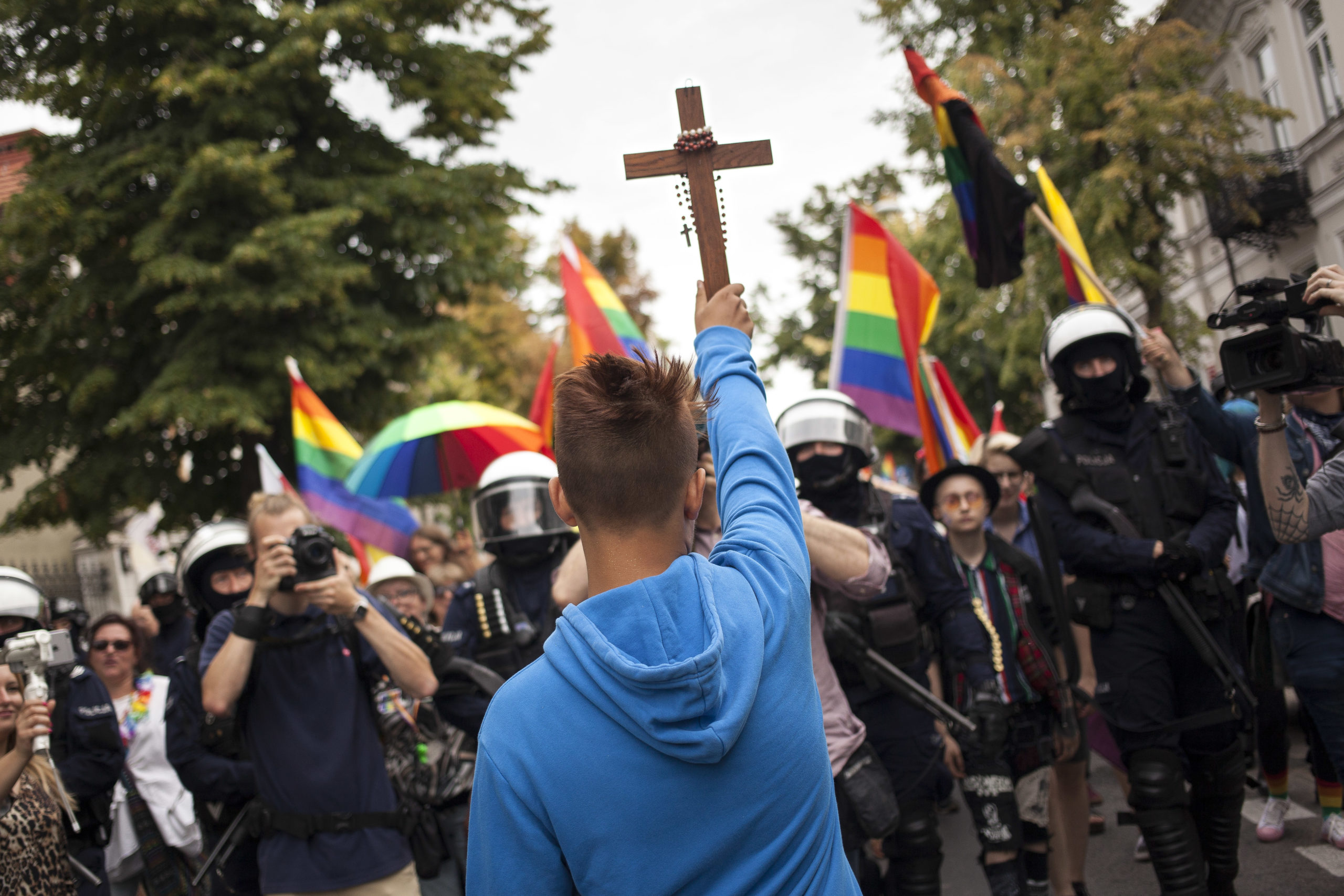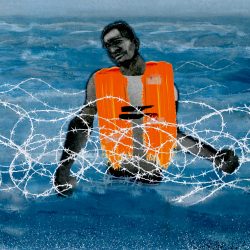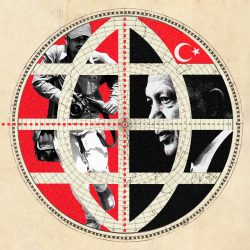
Maciej Luczniewski/NurPhoto via Getty Images
Poland’s anti-gay crusade: “The most aggressive homophobic campaign I have seen in my life”
Justyna Szpanowska was cycling through Warsaw in mid-August, when she heard what, at first, sounded like a coronavirus public safety announcement. As she got closer to its source, she realized it was nothing of the sort. Following the sound, she came across a truck slowly making its way down a busy road in the city center. Its back was lined with speakers playing a prerecorded message, warning passersby that gay couples commit pedophilia against babies.
In the passenger seat was a blogger with the ultra-conservative LGBT hate group “Fundacja Pro — Prawo do Życia” (Pro Right to Life Foundation), holding a camera.
Szpanowska, an activist with the left-wing Razem (Left Together) party, explained that around 100 people had gathered near the vehicle to express their outrage at its message. “I’m sure he was trying to provoke a reaction from the crowd for infotainment,” she said.
Since its 2015 election victory, Poland’s right-wing Law and Justice party has leveraged prejudice against the LGBTQ community for political gain. In 2019’s parliamentary elections, the party’s leader Jaroslaw Kaczynski claimed his victory would prevent “homosexual marriages.” And, ahead of last month’s presidential polls, President Andrzej Dudza described so-called LGBTQ ideology as “a kind of neo-Bolshevism.”
Along with hate-mongering against queer people, the Polish government has frequently referred to “gender ideology,” an international conspiracy theory that claims Marxists are plotting to destroy white nuclear households by erasing differences between men and women. Attacking “imported” sexuality and reproductive rights while pledging allegiance to the “pro traditional family” is what historian Andrea Peto describes as “a nationalist neoconservative response to the crisis of the global neoliberal world order.”
The impact has been devastating. In the past year, nearly 100 local governments, representing a third of Poland’s territory, declared themselves “LGBT free zones.” A 2020 report from an academic at Nicolaus Copernicus University in Toruń estimates that the number of queer people under the age of 25 who attempt suicide increased from 30% in 2016 to 45% in 2020. Kolodziej found that 84% of young LGBTQ people are now having suicidal thoughts.
“I don’t know what’s going to happen,” said Helena de Cleyre, a 29-year-old trans-activist who lives in Warsaw. Almost every day she hears about attacks against LGBTQ people.
“Mostly what I am thinking about is migration,” said Cleyre. “I want to be treated like a citizen. I don’t want my neighbors and people in public to treat me like I am not a human being.”
In April 2019, the ultra-conservative LGBT group Fundacja Pro drove a car around the city of Gniezno, a Catholic stronghold in western Poland, with a banner that read, “What the LGBT lobby wants to teach kids: masturbation; consenting to sex; first sexual experiences and orgasm. Stop pedophilia.” Since then, these cars and vans have become a common sight in big cities.
“It is the most aggressive homophobic campaign I have seen in my life,” said Katarzyna Warecka, a lawyer for the LGBTQ group Tolerado, based in the predominantly liberal port city of Gdansk. Last year, she tried to sue Fundacja Pro for “spreading false and homophobic content about the alleged link between pedophilia and homosexuality.” However, the court ruled against it. Subsequently, none of the city’s schools, councils and other public institutions have spoken out against the group.
More recently, people have started confronting Fundacja Pro’s vans directly on the street. On August 8, gender-non-binary activist Malgorzata Szutowicz was held in pre-trial detention for three weeks for slashing the tires of one such vehicle. In the protests that followed, the police arrested 48 people, including one passerby who had simply exited a nearby grocery shop and was carrying a shopping bag.
A week after Szutowicz’s arrest, 27-year-old software developer Linus Lewandowski saw a Facebook post about a Fundacja Pro van near his Warsaw apartment. He arrived at the scene in time to try and cover up the van’s massive banner with swirls of orange-colored graffiti. The incident was filmed by Maciej Zemla, a reporter from the right-wing online TV channel wPolsce.pl. Zemla made a name for himself in May 2019 by filming an LGBTQ volleyball event without permission and using the footage to give the false impression of a gay plot to bring “erotic gadgets” into primary schools.
Lewandowski is one of the 48 arrested during the protests after Szutowicz’s detention. Since then, he has had to report to his local police station twice a week. He has been charged with being part of a plot to violently attack property. The charges are “completely bogus”, he said.
Lewandowski has first-hand experience of the worsening climate for LGBTQ communities in Poland. In August, he and his boyfriend were beaten up by two strangers, who had seen them walking hand-in-hand. Despite the bleak situation, he sees some possibility for change and plans to run for office in Poland’s parliamentary elections in three years’ time.
While liberal politicians used to claim to be “neutral” on queer rights, last month, a group of Polish opposition MP’s came to parliament dressed in the colors of the rainbow, in order to protest the government’s rhetoric. “If the current government falls,” said Lewandowski, “we will probably get rights that we have been fighting for.”
Spearheading the anti-LGBTQ campaign
Mariusz Dzierzawski, who founded Fundacja Pro in 2005, describes himself as a Christian “seeker of truth.” He is also known as Poland’s “most radical anti-abortionist,” even though the country already has some of the strictest abortion laws in Europe. Since 2015, the group has turned its attention to criminalizing sex education in schools, with a homophobic campaign called “Stop Pedophilia.”
On its campaign website, Fundacja Pro spreads pseudoscience and disinformation that purports to link LGBTQ people and sex education to child sex abuse.
The group bases its many claims on the research of U.S. sociologist Mark Regnerus and psychologist Paul Cameron, whose discredited work is cited by a wide variety of anti-LGBTQ groups.

Malgorzata Szutowicz is a founding member of the queer activist group Stop Bzdurom (Stop the Bullshit). Founded one year ago, its members organized dance events to block Fundacja Pro’s vans — which some activists call “homophobuses” — and information stalls on LGBTQ issues. More recently, they put rainbow flags and anarchist symbols on statues in Warsaw, enraging Poland’s conservative government.
“We are only three, four or five people at times,” Szutowicz said. “We would do our actions, post about it on social media and wait for feedback.”
Szutowicz and her partner Lania Madej started the group after they came across a Fundacja Pro information stall, where volunteers were handing out leaflets and collecting signatures to support their “Stop Pedophilia” law. This proposed legislation demands jail sentences for anyone who teaches sex education to people under the age of 18. Fundacja Pro’s bill was co-drafted by a lobbying group named the Ordo Iuris Institute for Legal Culture — an offshoot of an international ultra-conservative Catholic network known as Tradition, Family and Property.
In June 2019, Helena de Cleyre joined Szutowicz and Madej to protest against a Fundacja Pro stall in the city of Poznan. Upon arrival, they were stopped and questioned by police officers.
“For many years, there have been attempts to get basic rights legally for non-straight people in Poland but this has failed,” said Cleyre. “Many people believe what the Fundacja Pro trucks say, because the local priest is saying it, the local politician is saying it and especially because you have no sex education in schools.”
As the attacks against LGBTQ communities have increased, activists have found themselves facing a new front — the 100 local governments that have signed non-legally binding charters to declare themselves “free from LGBT ideology.” In July, the European Union announced it would no longer provide funding to six of the “LGBT-free” Polish towns.
In September 2019, Cleyre and some of her friends hit the road under the collective banner of the Queer Tour. Their plan was to drive to so-called LGBT-free zones, talk to local people and debunk the government’s propaganda. “It’s really difficult because you can waste so much time trying to convince just one person,” Cleyre said. “We try to say things like: ‘Hi, I am LGBT, do I look like I am destroying Poland?’ Sometimes it works.”
On a recent weekend, Queer Tour went to the south-eastern city of Debica. After setting up their stall, police officers surrounded them and made them leave, while the town’s mayor told them their actions were “illegal.”
Queer Tour and Stop Bzdurom send packages of stickers, comics and books to young LGBTQ people all over Poland. The stickers say things like “I am not an ideology” or show famous figures, including Jesus Christ, on a rainbow background. Since Szutowicz’s arrest, the groups’ go-to print shop is afraid to produce material for them.
“They sent us emails to say that they support what we do, but half of our designs are probably too controversial,” Szutowicz said, via Skype.
Szutowicz is still facing multiple charges for hanging rainbow flags on Warsaw monuments and for slashing the tires of the Fundacja Pro van.
In August, Stop Bzdurom received $80,000 in donations, which they would like to give to small collectives across Poland. But the Polish crowdfunding platform Zrzutka refuses to let the group withdraw the funds.
I recently spoke to Szutowicz and her life partner Lu, who is non-binary, via Skype. They had just ordered pizza and were getting ready to go to a house party.
Szutowicz explained that Stop Bzdurom has been forced to halt its activities after she and Lu were recently followed by plainclothes police officers. “Because of police investigations against us and being stalked all the time, we are not able to make any new actions right now,” Szutowicz said.
Meanwhile, international campaigners have asked the EU to protect Poland’s LGBTQ communities. Last week, activists delivered a petition with more than 340,000 signatures demanding that the EU take action against homophobia in Poland’s “LGBT-free” zones. The petition, launched by the global equality movement All Out, urged the EU’s commissioner for equality, Helena Dallito, to denounce the discriminatory policies and pass legislation on hate crimes to protect the Polish LGBTQ community.
In a sign of increasing international concern over the treatment of LGBTQ people, 50 ambassadors to Poland earlier this week wrote an open letter calling on Warsaw to help forge “an environment of non-discrimination, tolerance and mutual acceptance.” The signatories, including ambassadors from the U.S. and Britain, urged Poland to “end discrimination, in particular on the basis of sexual orientation or gender identity.”
Lu, who has recently started their own collective to hang up rainbow flags around Warsaw and throw paint over homophobic banners, was more optimistic. They read out a Facebook message sent by a stranger, who’d written to say, “Thank you…When I see the flag, I see that someone is fighting for me.”
The morning after we spoke, Szutowicz texted me to say she and Lu had been assaulted twice after the party. Later that evening, she texted me again: Lu had just been attacked. “The man had keys in his hands so Lu has bruises and swelling,” Szutowicz wrote.
“The situation is getting worse on many fronts in Poland and the problems are really important to me,” she said. “So if it gets worse, I have this stupid mindset of ‘I have to work harder because it’s not enough.’ But many of my friends and I are in a situation where you physically cannot do anything more.”
The story you just read is a small piece of a complex and an ever-changing storyline that Coda covers relentlessly and with singular focus. But we can’t do it without your help. Show your support for journalism that stays on the story by becoming a member today. Coda Story is a 501(c)3 U.S. non-profit. Your contribution to Coda Story is tax deductible.









